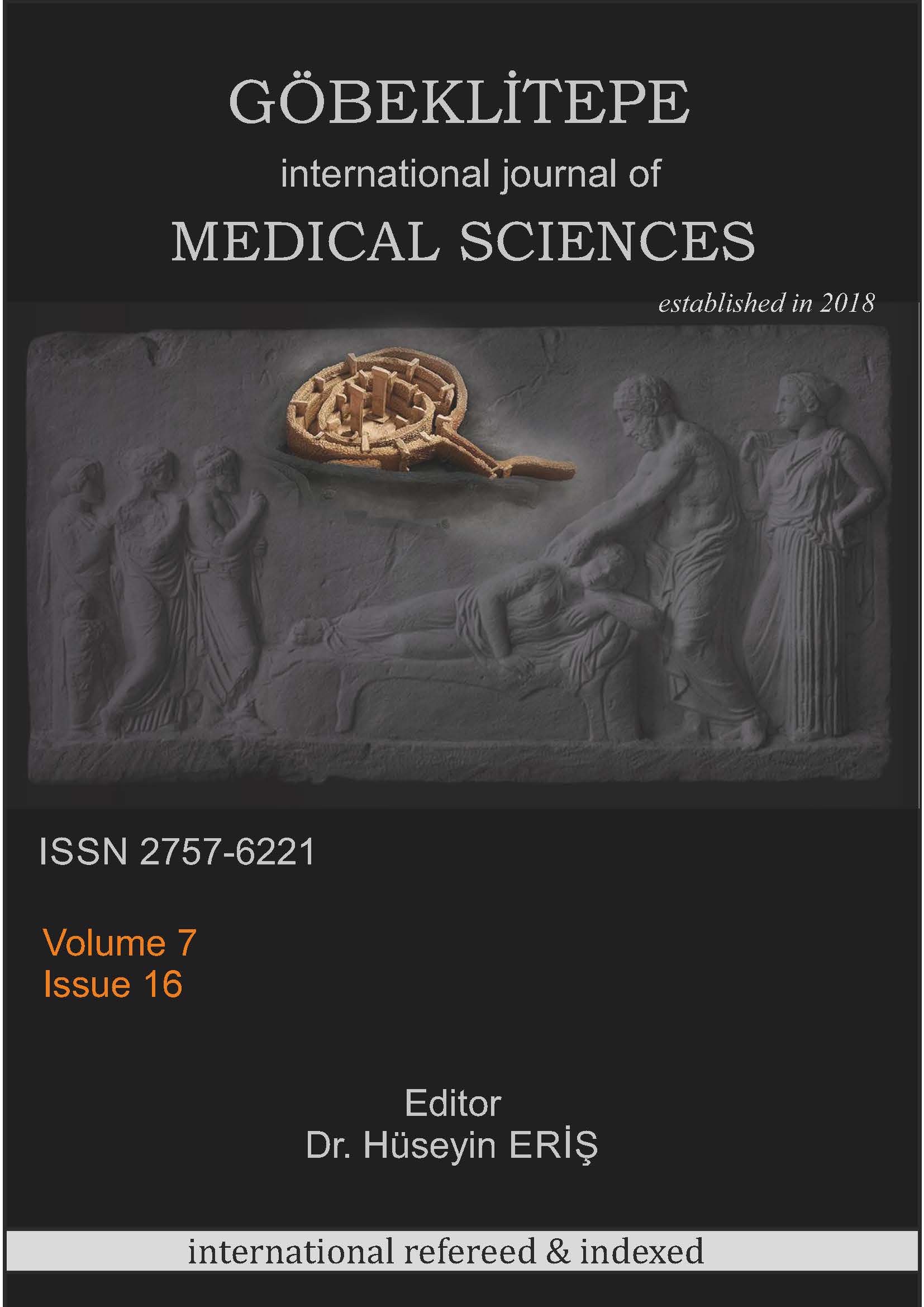COMFORT LEVEL OF PATİENTS RECEİVİNG HEMODİALYSİS TREATMENT AND AFFECTİNG FACTORS: DESCRİPTİVE AND CROSS-SECTİONAL STUDY
Hemodiyaliz hastalarında konfor
Keywords:
Comfort, dialysis, hemodialysis, patientAbstract
The research was conducted to determine the comfort level of patients receiving hemodialysis treatment and the affecting factors. The research conducted between January and March 2021, was conducted in three dialysis centers affiliated with hospitals located in two provinces in the Northeast of Turkey, with 145 patients receiving hemodialysis treatment within the scope of the research inclusion criteria. The data of the study were collected by face-to-face interview technique using the "Introductory Information Form", "Charlson Comorbidity Index" and "Hemodialysis Comfort Scale (HCS)". The HCS total mean score of the patients included in the study was 26.03±5.58, the Overcoming subscale mean score was 6.41±3.13, and the Relaxation subscale mean score was 19.67±4.59. It was found that 33.8% of the patients had a Charlson Comorbidity Index score between three and four. It was determined that the comfort levels of those who received hemodialysis treatment for six to ten years and those who received constant support from family members were significantly higher (p<0.05). It was determined that the comfort level of patients receiving hemodialysis treatment was at a moderate level, and the duration of treatment and receiving support from the family were among the factors affecting comfort. In this context, it is recommended to provide nursing care and practices that increase the comfort level of patients who have received hemodialysis treatment for ten years or more, and to ensure that patients are supported by family members during the treatment process.
References
Qiu, Z., Zheng, K., Zhang, H., Feng, J., Wang, L., Zhou, H. (2017). Physical exercise and patients with chronic renal failure: a meta-analysis. Biomed Research International, 2017, 1-8.
Wen, Q., Yao, S., Yao, B. (2022). Effectiveness of comprehensive nursing in hemodialysis of patients with chronic renal failure and the impact on their quality of life. Evidence-Based Complementary and Alternative Medicine, https://doi.org/10.1155/2023/9826372
Gerasimoula, K., Lefkothea, L., Maria, L., Victoria, A., Paraskevi, T., Maria, P. (2015). Quality of life in hemodialysis patients. Mater Sociomed, 27(5), 305-309.
Tuna, D., Ovayolu, N., Kes, D. (2018). Hemodiyaliz hastalarında sık karşılaşılan problemler ve çözüm önerileri. Nefroloji Hemşireliği Dergisi, 13(1), 17-25.
Hintistan, S., Deniz, A. (2018). Evaluation of symptoms in patients undergoing hemodialysis. Bezmialem Science, 6(2), 112-118.
Tabiee, S., Momeni, A., Saadatjoo, S. A. (2017). The effects of comfort-based interventions (back massage and patient and family education) on the level of comfort among hemodialysis patients. Modern Care Journal. 2017, 14(3), 1-6.
Kavurmacı, M., Tan, M. (2015). Üremik kaşıntı ve hemşirelik bakımı. Anadolu Hemşirelik ve Sağlık Bilimleri Dergisi, 18(1), 57-62.
Gülay, T., Eler, Ç. Ö., Ökdem, Ş., Çıtak, E. A. (2020). Hemodiyaliz hastalarında konfor düzeyinin incelenmesi. Hacettepe Üniversitesi Hemşirelik Fakültesi Dergisi, 7(2), 122-129.
Yücel, Ş. Ç. (2011). Kolcaba’s comfort theory. Journal of Ege University School of Nursing, 27(2), 79-88.
Kolcaba, K. (2003). Comfort Theory and Practice A vision for holistic health care and research, Springer Publishing Company, New York. 57.
Vicdan, A. K. (2020). The Effect of Training Given to Hemodialysis Patients According to the Comfort Theory. Clinical Nurse Specialist, 34(1), 30-37.
Borzou, S. R., Anoosheh, M., Mohammadi, E., Kazemnejad, A. (2020). Exploring perception and experience of patients from nursing care behaviors for providing comfort during hemodialysis. Journal of Qualitative Research in Health Sciences, 3(1), 1-13.
Çalışkan, T., Pakyüz, S. Ç. (2019). Hemodiyaliz tedavisi alan ve almayan üremik hastalarda kaşıntı konforu etkiler mi?. Nefroloji Hemşireliği Dergisi, 14(3), 84-96.
Turgay, G., Eler, Ç. Ö., Ökdem, Ş., Kaya, S. (2020). Hemodiyaliz hastalarında progresif gevşeme egzersizinin konfor düzeyine etkisi. Nefroloji Hemşireliği Dergisi, 15(1), 16-22.
Demir, C. A., Özer, Z. (2022). Hemodiyaliz tedavisi alan hastalarda semptom ve konfor ilişkisi. Nefroloji Hemşireliği Dergisi, 17(1), 10-27.
Melo, G. A. A., Aguiar, L. L., Silva, R. A., Quirino, G. D. S., Pinheiro, A. K. B., Caetano, J. Á. (2019). Factors related to impaired comfort in chronic kidney disease patients on hemodialysis. Rev Bras Enferm, 72, 889-895.
Dean, A. G., Sullivan, K. M., Soe, M. M. (2013) OpenEpi: Open Source Epidemiologic Statistics for Public Health, Version. [online]. Available from: https://www.openepi.com/Menu/OE_Menu.htm. [Accessed 15.01.2023].
Charlson, M. E., Pompei, P., Ales, K. L., MacKenzie, C. R. (1987). A new method of classifying prognostic comorbidity in longitudinal studies: development and validation. J Chronic Dis, 40(5), 373-83.
Orak, N. Ş., Pakyüz, S. Ç., Kartal, A. (2017). Ölçek geliştirme çalışması: Hemodiyaliz hastalarında konfor. Nefroloji Hemşireliği Dergisi, 12(2), 68-77.
Günalay, S., Taşkıran, E., Mergen, H. (2017). Hemodiyaliz hastalarında diyet ve sıvı kısıtlamasına uyumsuzluğunun değerlendirilmesi. İstanbul Bilim Üniversitesi Florence Nightingale Tıp Dergisi, 3(1), 9-14.
Rambod, M., Peyravi, H., Shokrpour, N., Sareban, M. T. (2010). Dietary and fluid adherence in Iranian hemodialysis patients. The Health Care Manager, 29(4), 359-364.
Lee, S. H., Molassiotis, A. (2002). Dietary and fluid compliance in Chinese hemodialysis patients. International Journal of Nursing Studies, 39(7), 695-704.
Gomez, T. A., Kiberd, J., Patrick Royston, B. A., Alfaadhel, T., Soroka, S. D., Hemmelgarn, B. R., Tennankore, K. K. (2015). Comorbidity burden at dialysis initiation and mortality: A cohort study. Canadian Journal of Kidney Health and Disease, 2(34), 1-9.
Downloads
Published
Versions
- 2024-10-06 (2)
- 2024-06-29 (1)
How to Cite
Issue
Section
License
Copyright (c) 2024 Göbeklitepe Sağlık Bilimleri Dergisi

This work is licensed under a Creative Commons Attribution 4.0 International License.




